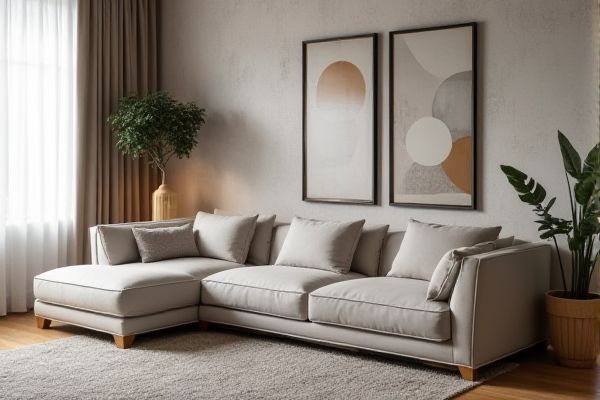
Corner sofas maximize seating by fitting snugly into room corners, ideal for creating cozy, space-efficient living areas. Modular sofas offer versatile arrangements customizable to your needs and space, allowing you to reconfigure seating easily; explore the article to discover which option suits your lifestyle best.
Table of Comparison
| Feature | Corner Sofa | Modular Sofa |
|---|---|---|
| Design | Fixed L-shaped structure | Customizable sections, reconfigurable |
| Flexibility | Limited layout options | Highly adaptable for space and needs |
| Space Utilization | Optimizes corner spaces | Adjustable to fit various room sizes |
| Assembly | Comes pre-assembled or with minimal setup | Requires assembly of individual modules |
| Maintenance | Challenging to clean hard-to-reach areas | Modules can be separated for easy cleaning |
| Cost | Generally lower price point | Usually higher due to customization |
| Style Options | Limited to fixed designs | Wide variety of styles and fabrics |
Introduction to Corner Sofas and Modular Sofas
Corner sofas maximize seating by fitting snugly into room corners, creating a cozy and space-efficient arrangement ideal for small to medium-sized living rooms. Modular sofas consist of separate, interchangeable pieces that can be rearranged to suit various room layouts and functions, offering high flexibility and customization. Both options optimize living space but cater to different design preferences and usage needs.
Defining Corner Sofas: Key Features
Corner sofas are designed to fit snugly into the corner of a room, maximizing seating space with a fixed L-shaped configuration ideal for smaller or defined living areas. They typically feature a continuous frame and cushions, providing a stable and cohesive look without the flexibility to rearrange sections. Your choice of a corner sofa offers comfort and style through its streamlined design, making it perfect for optimizing room corners efficiently.
What is a Modular Sofa? Characteristics Explained
A modular sofa consists of multiple independent sections or units that can be arranged, rearranged, or expanded to suit various room layouts and seating needs. Its key characteristics include versatility in configuration, ease of customization, and adaptability to different spaces, making it ideal for dynamic living environments. Unlike a fixed corner sofa, modular sofas offer flexible design options, allowing users to create unique seating arrangements by combining pieces such as loveseats, chaises, and ottomans.
Space Utilization: Which Sofa Fits Your Room Best?
Corner sofas maximize space by fitting snugly into room corners, making them ideal for compact or irregular layouts, while modular sofas offer flexibility with customizable sections that can be rearranged to suit changing space needs or room shapes. Your choice depends on whether you prioritize a fixed, space-efficient design or adaptable seating that can evolve with your room's configuration. Understanding your room dimensions and lifestyle will help determine which sofa type best optimizes space utilization.
Flexibility and Customization: Corner vs Modular Sofas
Modular sofas offer unparalleled flexibility and customization by allowing users to rearrange individual sections to fit various room layouts and personal preferences. Corner sofas provide a fixed L-shaped design ideal for maximizing space in specific areas but lack the adaptability modular systems deliver. Choosing between the two depends on the need for adjustable seating configurations versus a more permanent, space-efficient setup.
Comfort and Seating Capacity Comparison
Corner sofas typically offer fixed seating with ample space designed for optimal comfort in a single, continuous layout, making them ideal for cozy relaxation. Modular sofas provide flexible seating arrangements by allowing you to customize and expand configurations to accommodate varying group sizes and maximize room usage. Your choice depends on whether you prioritize a unified comfort experience or adaptable seating capacity for different occasions.
Style and Aesthetic Appeal Differences
Corner sofas offer a fixed L-shaped design that suits traditional and compact spaces, providing a cohesive and classic look. Modular sofas boast customizable configurations, allowing you to adjust style and arrangement dynamically to match contemporary or eclectic aesthetics. Your choice depends on whether you prefer a structured, consistent appearance or versatile design flexibility to enhance your living area.
Practical Considerations: Maintenance and Durability
Corner sofas typically offer sturdy construction with fixed frames, making maintenance straightforward and ensuring durability over time. Modular sofas provide flexibility with individual pieces that can be replaced or cleaned separately, which is ideal if you prioritize ease of upkeep and adaptability. Consider your lifestyle and space needs to determine whether the low-maintenance durability of a corner sofa or the customizable maintenance options of a modular sofa better suit your home.
Price Comparison: Value for Money
Corner sofas typically offer a lower upfront cost compared to modular sofas, making them a budget-friendly option for those seeking immediate value. Modular sofas provide greater customization and adaptability, which can justify their higher price through long-term versatility and personalized comfort. Evaluating price per square foot and longevity helps determine true value for money between these sofa types.
Choosing the Right Sofa: Final Tips and Recommendations
Choosing between a corner sofa and a modular sofa depends on your room layout, space availability, and lifestyle needs. Corner sofas maximize seating in a fixed L-shape, ideal for cozy living rooms, while modular sofas offer flexibility with customizable configurations that adapt to changing spaces or gatherings. Consider your daily usage, room dimensions, and whether you prefer a permanent setup or versatile seating to find the perfect sofa that suits your home and comfort requirements.
 homyna.com
homyna.com